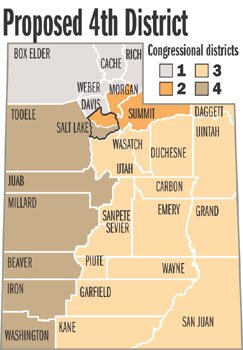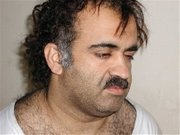Bush, GOP rebels agree on detainee bill

By ANNE PLUMMER FLAHERTY, Associated Press Writer 1 hour, 55 minutes ago
WASHINGTON - The White House and rebellious Senate Republicans announced agreement Thursday on rules for the interrogation and trial of suspects in the war on terror.
President Bush' name=c1> SEARCHNews News Photos Images Web' name=c3> President Bush urged Congress to put it into law before adjourning for the midterm elections.
The agreement contains concessions by both sides, though the White House yielded ground on two of the most contentious issues. The Bush administration agreed to drop one provision narrowly interpreting international standards of prisoner treatment and another allowing defendants to be convicted on evidence they never see.
The accord, however, explicitly states the president has the authority to enforce Geneva Convention standards and enumerates acts that constitute a war crime, including torture, rape, biological experiments and cruel and inhuman treatment. White House officials said these provisions would provide the
CIA' name=c1> SEARCHNews News Photos Images Web' name=c3> CIA the clarity it needs to continue with the interrogation of its most valued suspects.
The pact follows more than a week of squabbling among Republicans that had threatened to derail an anti-terrorism agenda put together by the White House and GOP leaders going into the Nov. 7 elections. It was announced at a time when support for Bush's proposal in the GOP-run Congress had been crumbling, but the agreement could lead to enactment of one of Bush's top remaining priorities of the year.
The House and Senate are expected to vote next week on the legislation.
"I'm pleased to say that this agreement preserves the single most potent tool we have in protecting America and foiling terrorist attacks," the president said after the agreement was announced.
Sen. John McCain (news, bio, voting record) of Arizona, one of three GOP lawmakers who told Bush he couldn't have the legislation the way he initially asked for it, said the deal "gives the president the tools he needs to continue to fight the war on terror and bring these evil people to justice."
The agreement would grant Congress' permission for Bush to convene military tribunals to prosecute terrorism suspects, a process the Supreme Court had blocked in June because it had not been authorized by lawmakers.
During those trials, coerced testimony would be admissible if a judge allows and if it was obtained before cruel, inhumane and degrading treatment was forbidden by a 2005 law. Bush wanted to allow all such testimony while the maverick senators — McCain, John Warner of Virginia and Lindsey Graham of South Carolina — had wanted to exclude it.
The central sticking point had been a demand by the three senators that there be no attempt to redefine U.S. obligations under the Geneva Conventions.
CIA Director Michael Hayden praised the deal a week after saying his agency needed to be confident that its interrogation program for high-value terror suspects is legal.
"If this language becomes law, the Congress will have given us the clarity and the support that we need to move forward with a detention and interrogation program that allows us to continue to defend the homeland, attack al-Qaida and protect American and allied lives," he wrote to CIA personnel.
Added
Stephen Hadley' name=c1> SEARCHNews News Photos Images Web' name=c3> Stephen Hadley, the president's national security adviser, on CIA interrogations: "The good news is the program will go forward."
Rep. Duncan Hunter (news, bio, voting record), R-Calif., indicated he was not satisfied with the piece on classified information: "We're going to look at it closely. And we have some recommendations with respect to classified information."
Hadley said the bar would be "very high" and that classified information would not be automatically shared with terrorists.
"Our view is we think it's a good approach because the likelihood of that occurring would be very remote," Hadley said.
Bush expressed support for the deal before microphones in Orlando, Fla., where he was campaigning for Republican candidates.
The agreement "clears the way to do what the American people expect us to do — to capture terrorists, to detain terrorists, to question terrorists and then to try them," he said.
The accord was sealed in a 90-minute session in the office of Senate Majority Leader Bill Frist, who had earlier in the day told Warner, McCain and Graham it was time to close the deal. The four lawmakers were joined by Hadley, as well as other administration officials, for the final session.
Senate Minority Leader Harry Reid, D-Nev., said Democrats backed the GOP's efforts to bring terrorists to justice. "Five years after 9/11, it is time to make the tough and smart decisions to give the American people the real security they deserve," Reid said.
The agreement was hailed by human rights groups.
"Today's agreement makes clear that the president cannot unilaterally downgrade the humane treatment standards of the Geneva Conventions," said Elisa Massimino, Washington director of Human Rights First.
Whatever the outcome, the controversy has handed critics of the president's conduct of the war on terror election-year ammunition.
Bush's former secretary of state,
Colin Powell' name=c1> SEARCHNews News Photos Images Web' name=c3> Colin Powell, dismayed the administration when he sided with Warner, McCain and Graham. He said Bush's plan, which would have formally changed the U.S. view of the Geneva Conventions on rules of warfare, would cause the world "to doubt the moral basis" of the fight against terror and "put our own troops at risk."
The handling of suspects is one of two administration priorities relating to the war on terror.
The other involves the president's request for legislation to explicitly allow wiretapping without a court warrant on international calls and e-mails between suspected terrorists in the United States and abroad. One official said Republicans had narrowed their differences with the White House over that issue, as well, and hoped for an agreement soon.
Republican leaders have said they intend to adjourn Congress by the end of the month to give lawmakers time to campaign for re-election.
The Supreme Court ruled in June that Bush's plan for trying terrorism suspects before military tribunals violated the Geneva Conventions and U.S. law.
The court, in a 5-3 ruling, found that Congress had not given Bush the authority to create the special type of military trial and that the president did not provide a valid reason for the new system. The justices also said the proposed trials did not provide for minimum legal protections under international law.
About 450 terrorism suspects, most of them captured in
Afghanistan' name=c1> SEARCHNews News Photos Images Web' name=c3> Afghanistan and none of them in the U.S., are being held by military authorities at Guantanamo Bay, Cuba. Ten have been charged with crimes.







